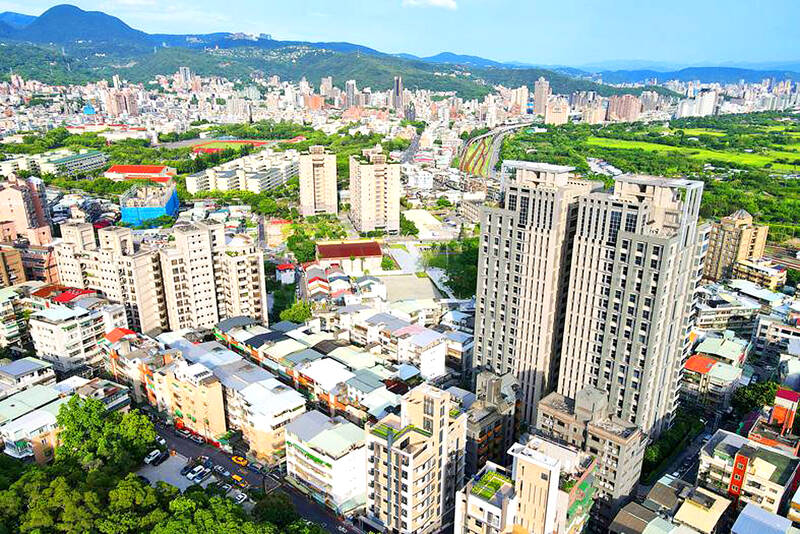Annual rent subsidies totaling NT$30 billion (US$930.23 million) would continue to be offered for 500,000 households as part of President William Lai’s (賴清德) “Million Support Project for Tenants,” a government official said yesterday.
The goal of the program is to provide 250,000 social housing units, 250,000 rental units under the scheme, and yearly rental subsidies totaling NT$30 billion for up to 500,000 households until 2032, said the official, who asked to remain anonymous.
The number of social housing units would increase by 35,000 every year, including 15,000 newly built units and 20,000 subleased and managed units, they said.

Photo: CNA
Meanwhile, the 2023-2024 program in April exceeded the target of 500,000 households approved for rental subsidies, two months earlier than estimated, a Ministry of the Interior report said.
The Executive Yuan approved of all the eligible applicants despite already having hit the target, the official said, adding that the ministry has submitted a revised plan.
Those who are eligible can continue to apply to the program without their rights and interests being affected, and the cost would be covered by the housing fund and, when that is insufficient, the National Treasury Administration, the official said.
The government would simplify the review process and improve operations for next year, they added.
Authorities would find land, including underutilized public property and old buildings, while also cooperating with schools to construct more social housing, the official said.
Citing the Measures to Promote Social Welfare Housing Policies and Increasing Usable Land for Housing Projects (推動社會住宅成果與提升社宅用地供給精進措施) passed in December last year by the Executive Yuan, the official said that 3 percent of development areas in the six special municipalities, and 5 percent in other administrative regions, should be reserved for social welfare facilities.
The reserved land needs comprehensive spatial planning to build “a small town” by integrating the social housing with essential public facilities such as daycare centers to meet the local needs, the official said.

LONG FLIGHT: The jets would be flown by US pilots, with Taiwanese copilots in the two-seat F-16D variant to help familiarize them with the aircraft, the source said The US is expected to fly 10 Lockheed Martin F-16C/D Block 70/72 jets to Taiwan over the coming months to fulfill a long-awaited order of 66 aircraft, a defense official said yesterday. Word that the first batch of the jets would be delivered soon was welcome news to Taiwan, which has become concerned about delays in the delivery of US arms amid rising military tensions with China. Speaking on condition of anonymity, the official said the initial tranche of the nation’s F-16s are rolling off assembly lines in the US and would be flown under their own power to Taiwan by way

CHIP WAR: The new restrictions are expected to cut off China’s access to Taiwan’s technologies, materials and equipment essential to building AI semiconductors Taiwan has blacklisted Huawei Technologies Co (華為) and Semiconductor Manufacturing International Corp (SMIC, 中芯), dealing another major blow to the two companies spearheading China’s efforts to develop cutting-edge artificial intelligence (AI) chip technologies. The Ministry of Economic Affairs’ International Trade Administration has included Huawei, SMIC and several of their subsidiaries in an update of its so-called strategic high-tech commodities entity list, the latest version on its Web site showed on Saturday. It did not publicly announce the change. Other entities on the list include organizations such as the Taliban and al-Qaeda, as well as companies in China, Iran and elsewhere. Local companies need

CRITICISM: It is generally accepted that the Straits Forum is a CCP ‘united front’ platform, and anyone attending should maintain Taiwan’s dignity, the council said The Mainland Affairs Council (MAC) yesterday said it deeply regrets that former president Ma Ying-jeou (馬英九) echoed the Chinese Communist Party’s (CCP) “one China” principle and “united front” tactics by telling the Straits Forum that Taiwanese yearn for both sides of the Taiwan Strait to move toward “peace” and “integration.” The 17th annual Straits Forum yesterday opened in Xiamen, China, and while the Chinese Nationalist Party’s (KMT) local government heads were absent for the first time in 17 years, Ma attended the forum as “former KMT chairperson” and met with Chinese People’s Political Consultative Conference Chairman Wang Huning (王滬寧). Wang

OBJECTS AT SEA: Satellites with synthetic-aperture radar could aid in the detection of small Chinese boats attempting to illegally enter Taiwan, the space agency head said Taiwan aims to send the nation’s first low Earth orbit (LEO) satellite into space in 2027, while the first Formosat-8 and Formosat-9 spacecraft are to be launched in October and 2028 respectively, the National Science and Technology Council said yesterday. The council laid out its space development plan in a report reviewed by members of the legislature’s Education and Culture Committee. Six LEO satellites would be produced in the initial phase, with the first one, the B5G-1A, scheduled to be launched in 2027, the council said in the report. Regarding the second satellite, the B5G-1B, the government plans to work with private contractors